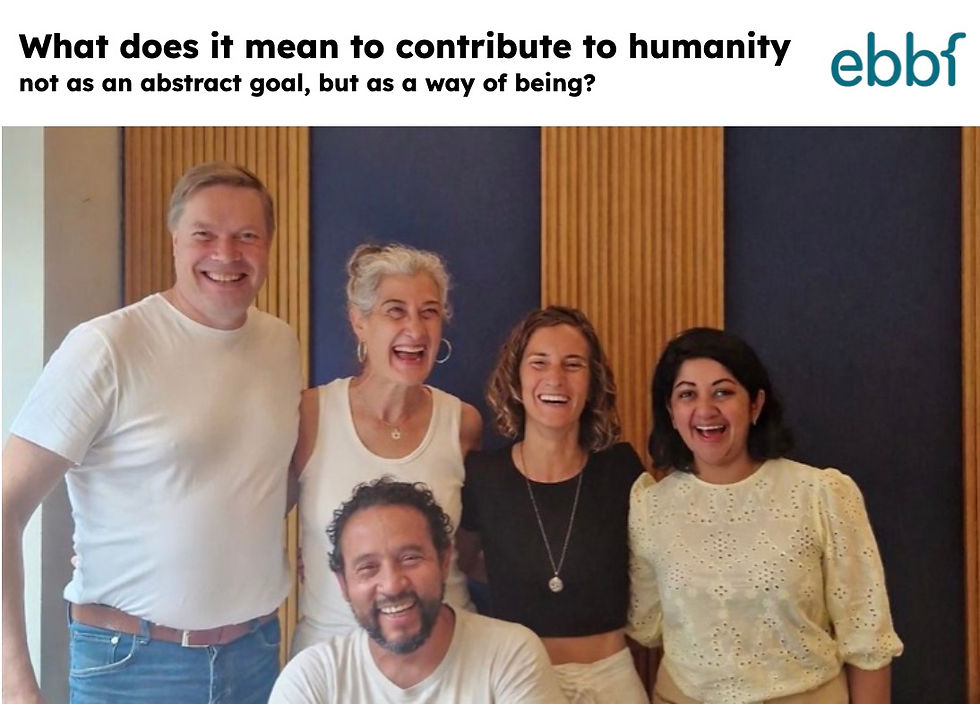#ebbfgovernance – what does governance mean to me? new mindsets, a first point of view by Gijs
- sjoerdluteyn
- Dec 4, 2017
- 3 min read
Governance meaning different things to different people, and rethinking governance being the main theme of the next ebbf international event, we asked Washington-based ebbf member Gijs van de Fliert this question. Gijs came up with a number of current frameworks that address governance from an old world order mindset: complying and avoiding the negative. The challenge that Gijs offers is how can we transition to a new governance system centred around and inspired by the dignity, respect, equality, and justice of individuals in our workplaces.
Thinking about governance, what words or concepts would come to mind?
“Our governance has always been geared towards avoiding the negative and inappropriate behaviours and outcomes. The definition of inappropriate has been shifting dramatically in the 21st century. Although companies instituted moral and ethics programs with codes of conduct and rules, these were often setup to meet the minimum standards of a nation’s rules and regulations. Often these rules were merely focusing on a code of conduct in business dealings with other institutions. For example elaborate schemes were set up to prevent corruption practices, such as bribes, fraud, collusion, coercion in public bidding of contracts.
Corporate Governance established the rules of how companies could be governed with separations between management, independent board members and shareholders, with employees often in a more troublesome role of whistleblower.
Emerging from the 20th century came a new risk framework discipline called operational risk management, which tried to
measure the risk of an employee or group of employees making mistakes that could cost the institution a financial loss or damage its reputation. The mistakes would include unintentional ones as well as deliberate ones for personal gain. From this risk framework, companies developed Risk Control Self Assessments (RCSA), were each unit or department would be quizzed about its processes and the risk of vulnerabilities in controls, which could lead to failures and hence losses.

Gijs van de Fliert
Another emerging framework is that of IT governance. How do we ensure that IT technology does what it is supposed to do and how do we prevent the introduction of malicious code for the gain of a few unscrupulous ones.
As such, the basis has always been the underlying assumption that humans are attracted to doing bad things for their own self gain. However, I believe that ethics and spiritual values are advancing ever so slowly. Human beings are becoming ever more vocal on those elements of humanity that deal with dignity, respect, equality, and justice of individuals. Where in the past many minorities or under privileged were abused for the personal gain of those in control; a ground swell of voices through social media, such as discrimination, sexual harassment, and women being underpaid in the work place, have made it possible to hold those committing these acts accountable thru the destruction of their reputation and the debarment from their former public roles.
All these have begun to bring the wrongs in institutions and society to the surface, but the journey to a more equitable and fair work place has yet to begin.”
What would be the questions about governance that you would be most interested to have answered and/or to learn more about?
From the above, the question I would be most interested in having answered about governance is how institutions would create the environment of trust, respect and justice that would replace the myriad rules and controls that dot the landscape of governing institutions today. In my mind, the adoption of fundamental spiritual principles would need to be at the grass roots of such an endeavor. How could a ground swell be raised for these ideas and bring them forward?
JOIN US
Come and join this and other meaningful conversations leading to action that we will enjoy at this next ebbf annual conference:







Comments